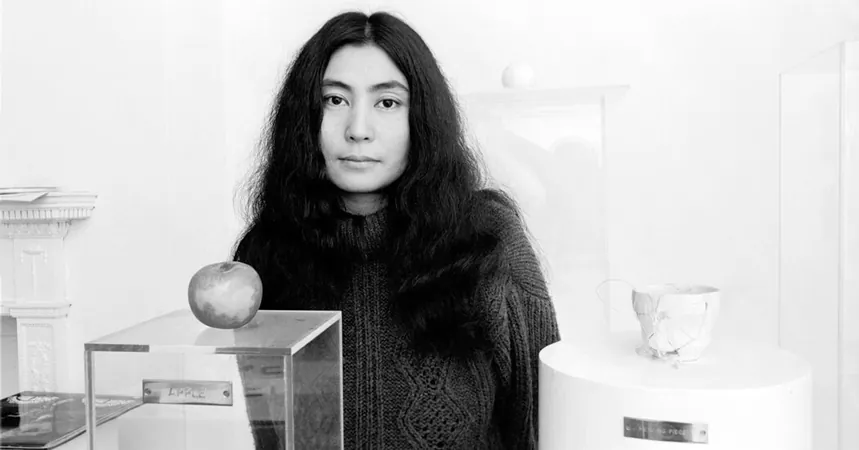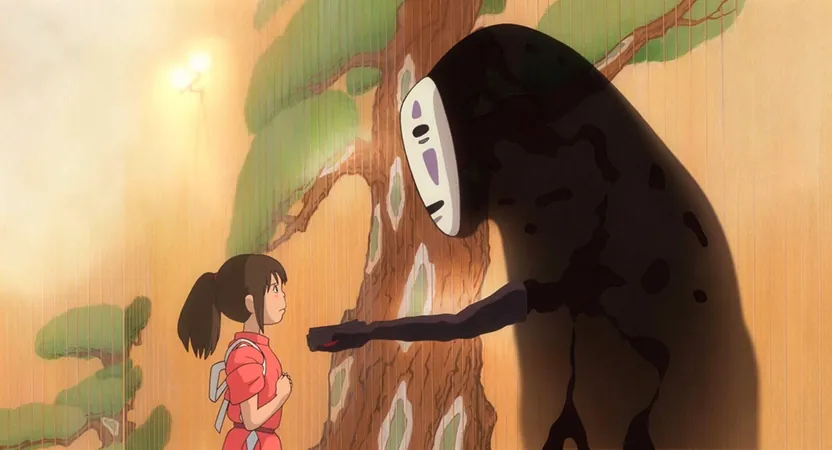
Unveiling the Enigma: A Deep Dive into David Sheff's Biography of Yoko Ono
2025-03-23
Author: Lok
David Sheff's latest biography, *Yoko: The Biography*, pulls back the curtain on the multifaceted life of Yoko Ono, the artist and widow of John Lennon. Often overshadowed by her relationship with the famous Beatle, Ono emerges in this biography as a compelling figure in her own right, weaving humor and depth into her storied existence.
Known for her sharp wit, Ono has responded to unexpected questions with unexpected candor. When asked about the possibility of forgiving her late husband’s assassin, Mark David Chapman, Ono quipped, “I’m not the pope,” instantly reflecting her unique blend of resilience and humor.
One of the biography’s highlights is Ono's artistic protest against gender and racial disparities in the art world. In 1971, during a promotion for a temporary exhibit at the Museum of Modern Art, she cleverly positioned a shopping bag to transform the sign into “Museum of Modern (F) Art,” defying limitations imposed on women and people of color long before such discussions became widespread in society.
Ono's distinct style extends into her personal anecdotes as well. Elton John recalled in his memoir, *Me*, how Ono whimsically justified selling her herd of Holstein cows, saying, “All that mooing,” offering a glimpse into her humor and ability to defy traditional expectations.
Now at 92 and mostly away from the limelight, Ono's past creates a difficult landscape for narratives about her life. Following Lennon’s tragic assassination in 1980, she faced betrayals from those she trusted, who broke confidentiality agreements to auction personal memorabilia or write tell-all accounts. Their thefts resulted in significant legal battles, with Ono's son Sean famously calling one thief's work “the best book I’ll ever burn” in court.
In recent years, however, Ono’s portrayal has begun to shift. The 2021 Disney+ documentary *The Beatles: Get Back* has contributed to a reevaluation of her legacy, subtly placing her within the context of The Beatles' story while showcasing her musical contributions during their creative process. Additionally, museums have organized retrospectives highlighting her involvement in the avant-garde Fluxus movement and her solo works, celebrating her role as a pioneering artist.
While other biographies have sought to uncover Ono’s life, Sheff's work stands out due to the collaborative input he received from her family, friends, and fellow artists, creating a narrative that is both sympathetic and comprehensive. His compassionate approach allows for a nuanced portrayal—a significant recovery from years of negative media representation that often depicted her as merely the "dragon lady" responsible for The Beatles' breakup.
Born Yoko in Tokyo in 1933, her early experiences shaped her disproportionately troubled yet creative life. The daughter of wealthy and emotionally distant parents, she faced personal challenges early on, including the trauma of World War II, which led her to experience scarcity and suffering at a young age. At just 12 years old, Ono witnessed bombings in Tokyo, and the ensuing years involved struggles that tested her resilience.
Ono's artistic legacy is marked by its boldness and innovation. She famously invited audiences to engage with her art, even to the extent of "finishing" her work, an early example of participatory art long before the term became fashionable. A notable piece, "Apple," featured a simple piece of fruit at an art gallery—a gesture later echoed by modern provocateurs like Maurizio Cattelan.
What's remarkable about Ono is the endurance of her spirit as she navigated life's hurdles while creating impactful art. Sheff's biography argues convincingly for her place as a survivor, a feminist icon, an avant-garde visionary, and an unrepentantly candid activist. For example, when criticized for licensing her song “Instant Karma” to Nike in 1987, she defended her choice with, “I got $800,000 which went to the United Negro College Fund. You have a problem with that?”
In an age dominated by social media, Ono’s participatory art has found new relevance. Notably, following the election of Donald Trump in 2016, she shared a 19-second audio clip of herself screaming on Twitter, encapsulating the distress that many felt at the time while demonstrating her enduring connection to contemporary discourse.
David Sheff's *Yoko: The Biography* brings a restorative narrative to Ono's complex legacy, encouraging readers to see her not just through the lens of her past but as a vital, creative force. The biography serves as an essential exploration of a woman who defied categorization and remains a significant figure in the arts and culture—a true ocean child in the face of turbulent waters.
*Yoko: The Biography* by David Sheff is available now, and with its 384 pages filled with insights, art, and anecdotes, it promises to be a captivating read for anyone interested in the life of this extraordinary woman.



 Brasil (PT)
Brasil (PT)
 Canada (EN)
Canada (EN)
 Chile (ES)
Chile (ES)
 Česko (CS)
Česko (CS)
 대한민국 (KO)
대한민국 (KO)
 España (ES)
España (ES)
 France (FR)
France (FR)
 Hong Kong (EN)
Hong Kong (EN)
 Italia (IT)
Italia (IT)
 日本 (JA)
日本 (JA)
 Magyarország (HU)
Magyarország (HU)
 Norge (NO)
Norge (NO)
 Polska (PL)
Polska (PL)
 Schweiz (DE)
Schweiz (DE)
 Singapore (EN)
Singapore (EN)
 Sverige (SV)
Sverige (SV)
 Suomi (FI)
Suomi (FI)
 Türkiye (TR)
Türkiye (TR)
 الإمارات العربية المتحدة (AR)
الإمارات العربية المتحدة (AR)